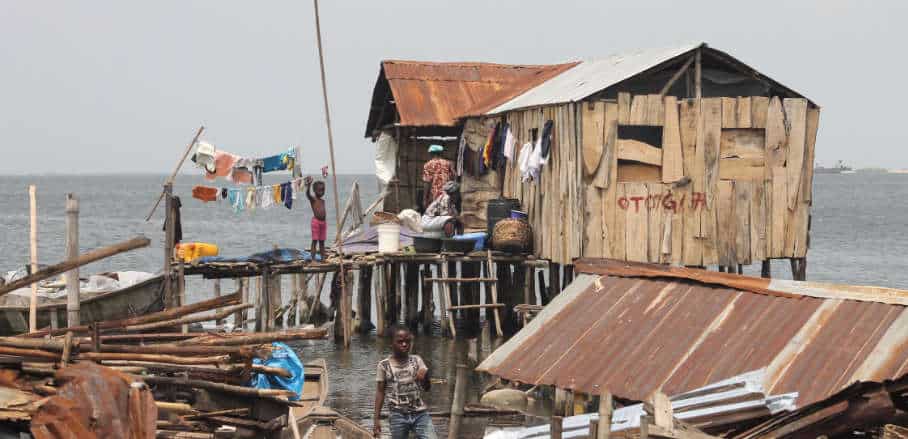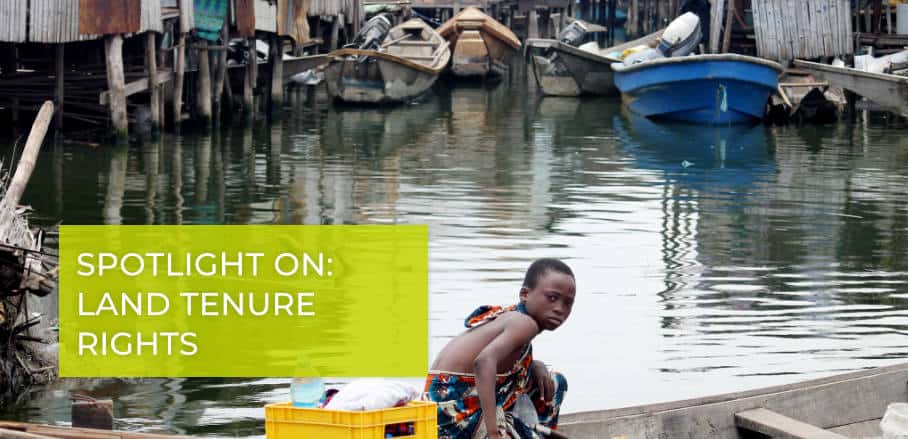How a Misdirected Land Use Law Disregards Coastal Dwellers’ Rights
Lagos’ Waterfront Infrastructure Development Law facilitates the sacrifice of the rights of coastal residents to commercial real estate development. Omotayo Odukola on the constitution and unjust implementation of a land use law.
Located in South-West Nigeria along coastal lines and occupying an area of just about 356,861 hectares of land, Lagos is home to over six million people, according to the 2006 National Population Census of Nigeria. Current estimates have updated the population figures to be over 20 million. Lagos is one of the fastest growing cities in the world, with a new arrival every minute. This is largely due to an exponential increase in rural to urban migration in the country and the economic opportunities available in the city. An increase in urban migration has resulted in a perennial housing problem in Lagos.
At the same time, land use laws and other governmental policies have mostly been used as a strategic tool for the commodification of housing, resulting in an unequal distribution of wealth. This is the case with the Land Use Act of 1978 and the Waterfront Infrastructure Development Law of the State of Lagos, which was enacted in 2009 and is based on the power of compulsory acquisition under the Land Use Act. Consequently, just like other major cities in Africa, South America and Asia, Lagos is facing the challenges of an urbanisation process that is defined by forced evictions and displacements.
Land Use Laws that Enable the Displacement of Coastal Residents
The Land Use Act vests all land in the state governors and also allows the expropriation of privately owned property for an overriding public interest. Expanding the powers of the governor given by the Land Use Act, the Waterfront Infrastructure Development Law of Lagos State seeks to regulate waterfront infrastructure development in Lagos and for other connected purposes. It specifies that the governor must ensure a balance between economic development and preservation, to allow the beneficial use of the waterfront, to preserve open space and public access to the shoreline, and to prevent erosion, diminution of scenic beauty or permanent negative changes to ecological systems. This legislation denies the current realities of inhabitants of coastal areas in Lagos as it suggests that such areas are vacant and unoccupied. Contrary to this narrative, coastal communities have been in existence for decades, with some inhabitants having ancestry connections to these lands.

Normalcy for waterfront dwellers © Chimee Adioha/SPACES FOR CHANGE
In 2016 and 2017, the Lagos State Government demolished Otodo-Gbame, a fishing community situated along Lagos creeks and coastline in the upscale Lekki area of Lagos. Negative stereotypes and narratives were primarily deployed to label the inhabitants as criminal elements who needed to be flushed out to protect lives and properties in the state. The residents of this community were forcefully evicted and displaced, and their homes demolished to give way for commercial redevelopment without resettlement plans or adequate compensation.
Though the Waterfront Law was never cited as the rationale behind the demolition and displacement, the development of highbrow residential estates on the said land gives life to the provisions of the Waterfront law. Under the guise of development, government-led infrastructural projects are increasing massively, including the construction of Eko Atlantic, Lekki Free Trade Zone, Lekki-Epe International Airport, jetty bridges, and massive commercial real estate developments. At the epicentre of these infrastructural projects are the voiceless communities that suffer the backlash of displacements and government acquisition of their lands.
What the Waterfront Law Portends for Waterfront Communities
Though not yet articulated as a reason for eviction or displacement, the Waterfront Law can potentially be used by state actors to infringe on citizens’ social and economic rights. The fact that the law contains a provision that gives the governor power to remove any obstruction that inhibits access to the waterfront reinforces this fear. This provision can be interpreted to include structures in the coastal communities. This was the case at Ilubirin, Otodo-Gbame, and the Oni-Jegi coastal communities which were demolished to give way for Ilubirin Estate, Periwinkle Estate and the Eko Atlantic City Projects respectively. None of these elaborate real estate developments provides for the resettlement of the original dwellers that were displaced.
Coastal Residents’ Rights Must Not Be the Price of Real Estate Development
Like many other related laws and state policies on this issue, the Waterfront law portends to sacrifice the economic, cultural and social rights of the inhabitants of coastal communities on the altar of commercial real estate development. Although development is essential to any society, derogation from citizens’ economic and social rights is a hefty price to pay for such development.
Most of the demolition exercises carried out by the government in the past have been about developing luxurious real estates. These have only benefitted the rich and big property corporations, rather than creating sustainable and affordable housing for the poor who need them most. For instance, Ilubirin is being developed into a highbrow estate and Otodo Gbame has been developed into Periwinkle Estate – these estates are only accessible to the rich.
This also seems to reflect political intentions, considering the statement of the Honorable Commissioner of Environment, Mr Tunji Bello, at a discussion about the risks of infrastructural developments in Lagos in 2012: “Are there low-cost houses in New York City? … Is there anywhere in the world where the poor live beside the ocean view?”
Although the economic, cultural, and social rights as encapsulated in Chapter 2 of the Constitution of the Federal Republic of Nigeria, which contains the right to housing, are not justiciable, the state is enjoined to conform to, observe and apply these rights through laws, policies and regulations. The right that gives the rich and the political elite access to “ocean view” and luxurious estates cannot and should never trump the rights of urban poor and dwellers of coastal communities to housing and economic security as most of these residents of these communities depend on the waters around their communities for economic survival.
It is therefore important that the Lagos State Government balances the right of coastal dwellers to housing and the need for development in the implementation of the Waterfront Law. This balance can be achieved through consultations with coastal communities and enabling residents to actively participate in the formulation of developmental policies that will affect them.
- How a Misdirected Land Use Law Disregards Coastal Dwellers’ Rights - 25. March 2021
